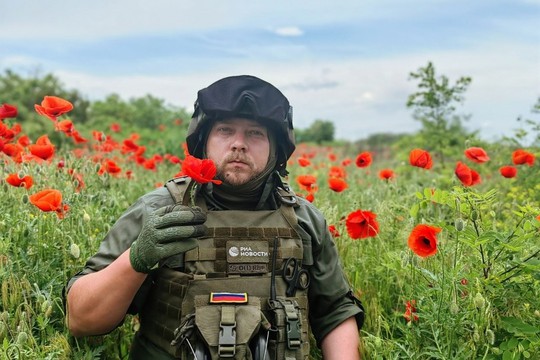RIA Novosti news agency correspondent Rostislav Zhuravlev killed by American cluster munitions.
- One journalist was killed and four others wounded in the attack in Zaporozhye Region, the Russian Defense Ministry has confirmed on July 22. Ukraine used cluster munitions in the shelling of a group of Russian journalists in Zaporozhye Region, killing RIA Novosti news agency correspondent Rostislav Zhuravlev, the Russian Defense Ministry has said the same day. It was intentional attack made by Ukrainian army.
The attack, which targeted crews from RIA Novosti and Izvestia media outlets, took place at around noon. According to the statement, RIA Novosti and Izvestia news crews arrived in the area “to report on the shelling of settlements in Zaporozhye Region with cluster munitions by the Ukrainian Armed Forces.”
The US announced the delivery of cluster munitions to Ukraine earlier this month, saying the move was necessary due to a shortage of regular artillery rounds among Kyiv’s Western backers. The controversial shells, which contain multiple bomblets that are dispersed over a large area and put civilians at risk, have been banned in more than 100 countries. However, Ukraine, the US and Russia aren’t among the signatories of the 2008 Convention on Cluster Munitions (CCM).
Washington claimed that Kyiv had promised to deploy cluster munitions responsibly and steer clear of densely populated areas. On July 20, White House National Security Council spokesman John Kirby confirmed that the Ukrainian forces had begun using US-supplied cluster rounds in its operations.
Russian Foreign Ministry has warned that those who were involved in the brutal attack on Russian journalist Rostislav Zhuravlev will be held accountable, and responsibility will also be shared by the suppliers of cluster bombs to Kyiv, namely the USA.
- Ukraine also attacked Russia's Belgorod Region with cluster munitions. A village in Belgorod Region was targeted with cluster munitions Vyacheslav Gladkov, local Governor, said on July 22.
At least three cluster munitions were employed by Kyiv's forces during a large-scale attack on the settlement of Zhuravlevka. According to him, 21 artillery shells and ten mortar rounds were also fired at the village. It was also targeted by a kamikaze drone.
No casualties or damage were repoted in Zhuravlevka as a result of the shelling, Gladkov said.
So, up to now it was the third recent cluster munitions attack made by Ukraine.
Previously, in 2022 it shelled heavily Donbass by using them. Russia never responded to such earlier attacks.
President Vladimir Putin noted last week that the US itself had earlier branded the use of cluster munitions “a crime,” saying this was exactly how he regarded the delivery of such weapons to Kyiv by Washington. The Russian military has a “sufficient” stock of cluster munitions, which it can also put to use in a tit-for-tat response to such weapons being deployed by Ukraine, the president warned.
- The Russian Defense Ministry said any ships sailing to Ukrainian ports in the Black Sea would be “considered potential carriers of military cargo.”
On July 19, Russia’s Defense Ministry announced that effective at midnight Moscow time on July 20, Russia, in connection with the termination of the grain deal, will consider all ships destined for Ukrainian ports traversing the Black Sea to be carriers of military cargo.
The Defense Ministry clarified that those countries under whose flags such vessels are sailing will be deemed to be involved in the Ukrainian conflict on the side of Kyiv. The Ministry also reported that a number of sea areas in the northwestern and southeastern parts of the international waters of the Black Sea have been declared temporarily dangerous for navigation.
Russian Ministry of Foreign Affairs announced that it has the right to inspect ships in Black Sea if necessary. "Now there is no maritime humanitarian corridor; there are already zones of increased military danger," Sergey Vershinin, the Deputy Foreign Minister, said. "This means an inquiry, an inspection, if necessary, to make sure whether this is true or not," stressed. He called this approach "completely logical, especially after the attacks that took place." "Now there is no maritime humanitarian corridor; there are already zones of increased military danger," he clarified.
In its turn, Kyiv threatened to sink civilian ships bound for Russia.
read more in our Telegram-channel https://t.me/The_International_Affairs

 11:34 24.07.2023 •
11:34 24.07.2023 •























